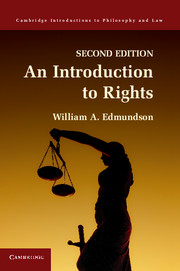Book contents
- Frontmatter
- Contents
- Preface to the First Edition
- A Note on the Second Edition
- A Note on Citation Form
- List of Tables
- Part One The First Expansionary Era
- Part Two The Second Expansionary Era
- 6 The Universal Declaration, and a Revolt Against Utilitarianism
- 7 The Nature of Rights
- 8 A Right to Do Wrong? Two Conceptions of Moral Rights
- 9 The Pressure of Consequentialism
- 10 What Is Interference?
- 11 The Future of Rights
- 12 Conclusion
- Bibliographical Notes
- References
- Index
Bibliographical Notes
from Part Two - The Second Expansionary Era
Published online by Cambridge University Press: 05 June 2012
- Frontmatter
- Contents
- Preface to the First Edition
- A Note on the Second Edition
- A Note on Citation Form
- List of Tables
- Part One The First Expansionary Era
- Part Two The Second Expansionary Era
- 6 The Universal Declaration, and a Revolt Against Utilitarianism
- 7 The Nature of Rights
- 8 A Right to Do Wrong? Two Conceptions of Moral Rights
- 9 The Pressure of Consequentialism
- 10 What Is Interference?
- 11 The Future of Rights
- 12 Conclusion
- Bibliographical Notes
- References
- Index
Summary
These notes cover only a part of the vast and growing literature on the subject. I indicate the readings that most influenced the writing of this book and other sources the curious reader might next consult.
The Prehistory of Rights
Although MacIntyre (1981) and Dover (1974) find ancient Greece not to have been receptive to our notions of rights, Fred D. Miller (1995) argues a contrary result. Joseph Raz (2004) explains that possessing the concept of a practice (such as respecting rights) is not essential to engaging in that practice. That the Romans were in firm command of subjective rights is argued in Witte, Jr. (2007). My discussion of the mediaeval disputes is heavily indebted to Tuck’s account (1979). Schneewind (1998) and Skinner (1978) are also extremely helpful, and on the “peculiar institution” of slavery, Davis (1966) is indispensable. The differences between Lee Kuan Yew and Amartya Sen are set out by Sen (1999). Glendon (1991) cautions against the contemporary obsession with rights, and Wellman (1998) and others warn of the expansionary tendency of loose rights-talk. The “endowment effect” has been confirmed experimentally by Thaler (1990).
- Type
- Chapter
- Information
- An Introduction to Rights , pp. 163 - 166Publisher: Cambridge University PressPrint publication year: 2012



